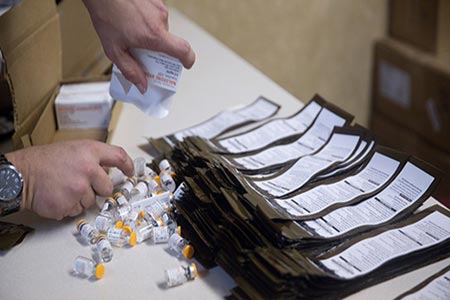Responding to a record number of drug overdose deaths in the United States, Pfizer has made a commitment to Direct Relief to donate 1 million doses of the drug naloxone, which saves lives by reversing opioid overdoses.
The newly committed 1 million doses are in addition to the more than 1 million doses Pfizer has donated since 2017, which Direct Relief has distributed at no cost to nonprofit, community-based organizations across the United States.
Deaths and emergency room visits from opioid overdoses have accelerated during the COVID-19 pandemic. According to preliminary data released Wednesday by the Centers for Disease Control and Prevention, over 87,000 drug overdose deaths occurred in the United States in the 12 months ending in September 2020 – the highest number of deaths ever recorded in a 12-month period. Emergency room visits for opioid overdoses also rose 32% in May through October 2020 compared to the previous year, according to a February 3 article in JAMA Psychiatry.
Since 2017, Direct Relief has distributed Pfizer-donated naloxone to 725 organizations in 51 states and territories. Approximately 700,000 doses were distributed in 2020 alone. The Pfizer-Direct Relief program is believed to be the largest charitable naloxone initiative in the United States. Direct Relief distributes the naloxone in kits containing needles, syringes, and alcohol prep swabs donated by the global medical technology company BD.
"Pfizer's partnership with Direct Relief aims to save lives by making naloxone more readily available when quick action is needed to reverse opioid overdoses," said Niesha Foster, Vice President, Product Access, Global Health & Social Impact. "Our additional donation underscores our commitment to improving public health."
When it began in 2017, the program provided naloxone to community health centers and free and charitable clinics. As the program continued, the recipients broadened to include public health departments, harm reduction organizations like Virginia Harm Reduction Coalition and the Iowa Harm Reduction Coalition, and other opioid overdose prevention and treatment organizations.
Many of the organizations, in turn, provide the naloxone kits to opioid users, and family members and friends of opioid users, who are likely to be nearby to someone who overdoses. Some of the recipient groups provide training in the use of naloxone.
A recent study found that opioid deaths decreased by 21% when naloxone was distributed widely to first responders and laypeople likely to witness or experience an overdose, compared with minimal distribution to those groups. The study, published in Jan. 2020 in the International Journal of Drug Policy, found a 14% decrease in overdose deaths when naloxone was distributed to laypeople but not to first responders. A 2019 study in JAMA Internal Medicine found that laws allowing pharmacists to dispense naloxone "were associated with significant reductions in fatal overdoses."
Direct Relief last year retained a research organization to evaluate the naloxone access program. The organization interviewed 20 recipients, including harm reduction groups, community health centers and public health departments.
Providing naloxone to friends and family "allows for family members, neighbors, and friends to become the first responders," the program evaluation said. "This increases the likelihood of a timely response and, in turn, reduces the chances of fatal overdoses."
The evaluation found that the naloxone donations free up funds that recipients can use for other programs, such as street outreach, counseling, and needle exchange programs to reduce disease transmission.
Several interview participants highlighted the importance of providing opioid overdose prevention education alongside naloxone distribution. The organizations reported seeing strong interest from community members in becoming opioid overdose responders who receive naloxone and are trained to administer it.
Naloxone-receiving groups interviewed for the evaluation reported that the social isolation experienced during the COVID-19 pandemic had triggered increased drug use, overdoses and relapses.
For more information, please visit https://www.DirectRelief.org


